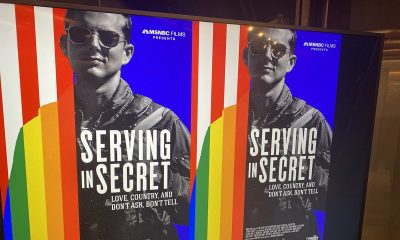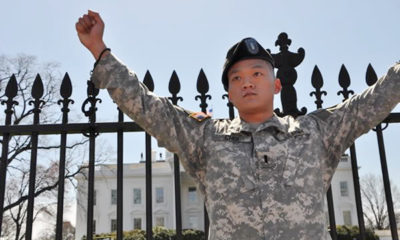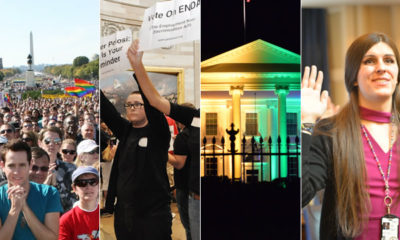Local
Judge rules against Choi in ‘vindictive’ prosecution claim
Gay activist on trial for arrest over White House protest
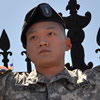
A federal judge ruled on Oct. 11 that gay former Army Lt. Dan Choi cannot argue in his ongoing trial that he was targeted for “selective” or “vindictive” prosecution following his arrest last year for chaining himself to the White House fence in a protest against “Don’t Ask, Don’t Tell.”
In a 17-page decision, Chief Judge Royce Lamberth of the U.S. District Court for the District of Columbia overturned an earlier ruling by Magistrate Judge John Facciola that allowed Choi’s lawyers to pursue allegations of selective or vindictive prosecution in the trial, which began Aug. 29.
Lamberth’s decision, among other things, granted a petition by prosecutors for a Writ of Mandamus, a formal and unusual request challenging a ruling of a trial judge by appealing to a higher court or to another judge with greater authority.
Under Lamberth’s decision, Facciola is prohibited from “considering selective or vindictive prosecution as a defense to the merits of the prosecution,” prohibited from “allowing evidence as to either claim” and barred from entertaining any motion filed by Choi to dismiss the case based on selective or vindictive prosecution.
Facciola is presiding over a non-jury trial in which Choi is being prosecuted for a misdemeanor charge of disobeying a lawful police order to disperse from the White House fence. Although the prohibition against Choi’s use of a defense based on selective or vindictive prosecution is a blow to the defense, one of his attorneys, Norman Kent, said Sunday that the defense will move forward on other grounds and that Choi’s defense team remains confident that Choi will be found not guilty.
Choi was the only one of a group of protesters arrested during the November 2010 protest that did not agree to plead guilty to the charge in exchange for having the case dismissed if they weren’t arrested again at the White House within a four-month period.
Through his attorneys, Choi has argued that he had a constitutional right to handcuff himself to the White House fence. The attorneys also have contested the government’s case on a technicality, saying police ordered Choi to disperse from the sidewalk. They note that Choi was standing on an elevated ledge on which the White House fence is attached, not the sidewalk itself and thus Choi was not legally bound to obey the police order.
Lamberth said in his decision that prosecutors were correct in arguing that under longstanding court rules of evidence, a case alleging selective or vindictive prosecution must be initiated in a pre-trial motion, not during the trial itself.
Choi’s attorneys — Kent of Fort Lauderdale, Fla., and Robert Feldman of New York — have argued that they lacked sufficient evidence of selective or vindictive prosecution prior to the start of the trial. The two said persuasive evidence of a selective-vindictive prosecution only emerged during their cross-examination of government witnesses during the trial itself.
Following strong opposition by the prosecutor in the case, Facciola ruled on Aug. 31 that preliminary evidence existed to show a selective or vindictive prosecution could have occurred against Choi. Facciola ruled that Choi’s lawyers could go forward with using selective-vindictive enforcement as a defense.
Feldman and Kent argued that Choi’s decision to handcuff himself to the White House fence in November 2010 was identical to two prior White House protests in which he and others handcuffed themselves to the fence. They noted that while prosecutors charged Choi in the earlier protests under a local municipal statute that carried no jail time, in the November 2010 protests, they charged Choi under a more stringent federal statute that includes a possible sentence of six months in jail.
Feldman and Kent alleged that prosecutors chose the more stringent statute in the November case because Choi’s protests were embarrassing the Obama administration over the gays in the military issue. They said the harsher prosecution was in retaliation for Choi’s political message that the White House wasn’t moving fast enough to repeal “Don’t Ask, Don’t Tell.”
Assistant U.S. Attorney Angela George, the lead prosecutor in the case, disputed that assertion, saying the government prosecuted Choi for refusing to obey a lawful order by police to move away from the White House fence. She said Choi’s political message was irrelevant to the government’s case and had no role in the decision to prosecute him.
In court briefs, George said prosecutors charged Choi under a more stringent law in the November case because it was the third time in less than a year that he had been arrested for the same illegal conduct and the government has legal discretion to select different statutes or regulations under which to make an arrest in such a case.
Facciola put the trial on hold on Aug. 31 after George said the government would take the unusual step of challenging his ruling through a Petition for a Writ of Mandamus. Under U.S. District Court rules, the court’s chief judge rules on such a petition.
Kent told the Blade on Oct. 16 that following consultation with Choi he and Feldman are strongly considering appealing Lamberth’s decision to the U.S. Court of Appeals for D.C. He said Choi’s legal team would make a final decision on whether to file an appeal by Oct. 20, a deadline set by Judge Facciola for the two sides to inform the court whether an appeal will be made or whether the trial will resume.
Choi enjoyed widespread support from LGBT activists when he worked with the LGBT direct action group GetEqual last year in a series of non-violent civil disobedience protests at the White House and other locations to pressure Congress and the Obama administration to push harder for repeal of “Don’t Ask, Don’t Tell.”
But since Obama signed legislation approved by Congress repealing “Don’t Ask, Don’t Tell” and since the repeal took effect on Sept. 20, some activists have questioned the rationale for Choi’s decision to demand a trial in the current case. Some have asked why Choi is contesting the type of civil disobedience arrest that most other protesters acknowledge involves breaking a law and choose to resolve by paying a small fine or agreeing to a plea offer like the one prosecutors made to Choi.
Gay rights attorney and television commentator Mark Levine called non-violent civil disobedience arrests an important and historic tradition in the U.S. civil rights movement made famous by Martin Luther King Jr. in his efforts to end racial discrimination. Levine said the benefit of drawing public attention to an injustice comes from the arrest itself, “not a long drawn out trial that has the potential for wasting court resources that would be better used for something else.”
Choi has said he chose to take his case to trial because he believes his action handcuffing himself to the White House fence is protected by his First Amendment right to free speech and should not be considered an illegal act.
Virginia
Parades, community events held to mark Pride Month in Va.
Upwards of 30,000 people attended PrideFest in Norfolk on June 22

Activists across Virginia last month held a series of events to mark Pride Month.
Hampton Roads Pride, a volunteer-run organization founded in 1997, held 37 different Pride events throughout the region in June.
Their biggest event, PrideFest, which is part of their larger three day event, Pride Weekend, celebrated its 36th anniversary on June 22. Pride Weekend took place from June 21-23 and began with a block party at NorVa in Norfolk.
PrideFest took place at Town Point Park, and an estimated 30,000 people attended. More than 70 venders participated, while Todrick Hall and Mariah Counts are among those who performed.
Another PrideFest event with a DJ in the afternoon and live music at night took place in Virginia Beach on June 23. Congressman Bobby Scott and U.S. Sen. Tim Kaine (D-Va.) are among those who attended Pride events in Suffolk on June 30.
Norfolk Mayor Kenneth Alexander, along with members of the Norfolk and Virginia Beach City Councils, also attended the Pride events in their respective cities. Jamar Walker, the first openly gay federal judge in Virginia, also took part.
“You know people all throughout Pride Month, at all of our various events, tell me all kinds of stories about their own experiences and the past of this community … and some of our older folks especially, remember when we couldn’t have this,” Hampton Roads Pride President Jeff Ryder told the Washington Blade on Monday during a telephone interview.
“It was a great year,” he added. “It was a big achievement for us to have unique celebrations in each of our seven communities. Each of these cities is so different from one another, but to be able to create a Pride celebration that’s unique in each of those places was really great, and I think really well received by folks who may not have felt represented previously. We’re always trying to do better, to embrace every aspect of our community, and take a big step forward there this year.”
State Dels. Adele McClure (D-Arlington County) and Alfonso Lopez (D-Arlington County) are among those who spoke at Arlington Pride that took place at Long Bridge Park on June 29. The Fredericksburg Pride march and festival took place the same day at Riverfront Park in Fredericksburg.
Republican Virginia Gov. Glenn Youngkin on June 10 hosted a Pride Month reception in Richmond.
Youngkin in previous years has hosted Pride Month receptions, even though Equality Virginia and other advocacy groups have criticized him for supporting anti-LGBTQ bills.
The Republican governor in March signed a bill that codified marriage equality in Virginia. Youngkin last month vetoed a measure that would have expanded the definition of bullying in the state.
Baltimore
Baltimore street named in honor of trans activist
Iya Dammons is founder of support groups Safe Haven in Baltimore, D.C.
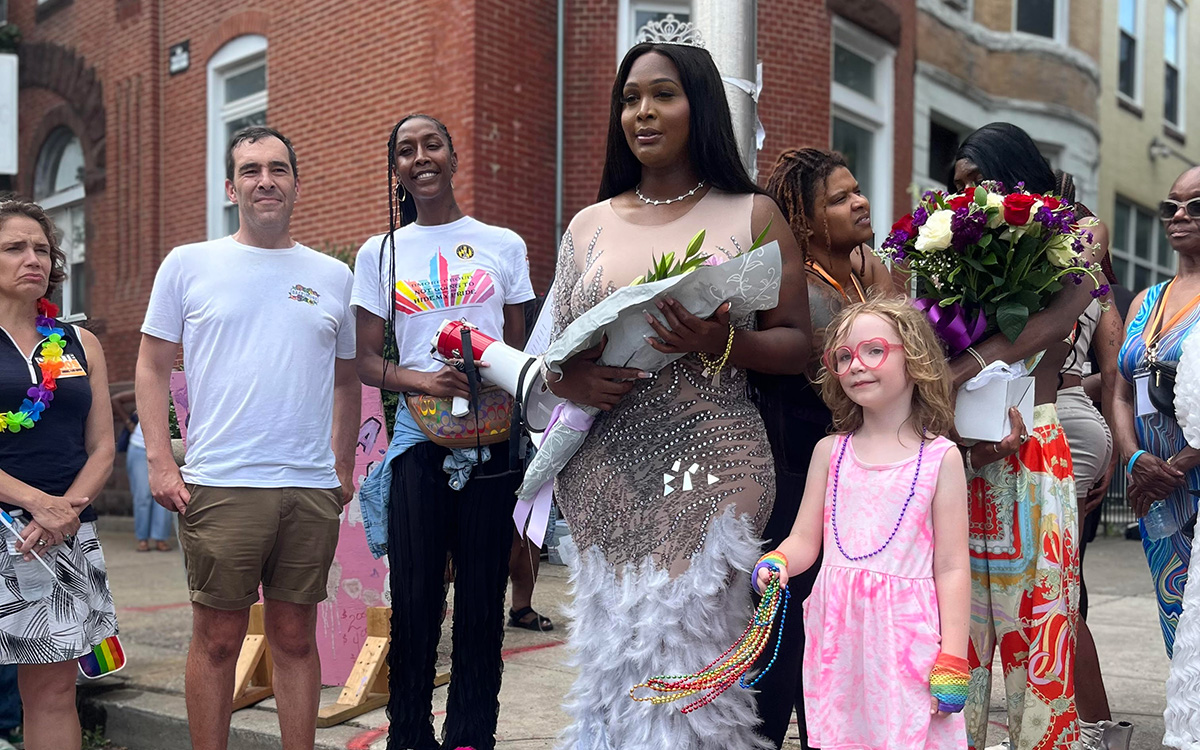
Baltimore city officials and LGBTQ activists participated in a ceremony on June 29 officially dedicating the renaming of a street in honor of transgender woman Iya Dammons, who founded and serves as executive director of the LGBTQ services organization Maryland Safe Haven.
A section of Baltimore’s 21st Street at the intersection of North Charles Street, where the Maryland Safe Haven offices are located, has been renamed Iya Dammons Way.
The ceremony took place six years after Dammons founded Maryland Safe Haven in 2018 and one year after she launched a Safe Haven operation in D.C.in 2023 located at 331 H St., N.E.
A statement on its website says Safe Haven provides a wide range of supportive services for LGBTQ people in need, with a special outreach to Black trans women “navigating survival mode” living.
“Through compassionate harm reduction and upward mobility services, advocacy support, and community engagement, we foster a respectful, non-judgmental environment that empowers individual agency,” the statement says. “Our programs encompass community outreach, a drop-in center providing HIV testing, harm reduction, PrEP, medical linkage, case management, and assistance in accessing housing services,” it says.
Among those participating in the street renaming ceremony were Baltimore City Council member Zeke Cohen, interim director of Baltimore Mayor Brandon Scott’s Office of LGBTQ Affairs Alexis Blackmon, and Dominique Morgan, an official with the national foundation Borealis Philanthropy, which provides financial support for transgender supportive nonprofit organizations, including Safe Haven.
“This is a significant achievement and historic moment for our city,” a statement by Maryland Safe Haven announcing the ceremony says. “Iya Dammons has been a tireless advocate for transgender rights and has worked tirelessly to provide safe spaces and resources for transgender individuals in our city,” it says. “This honor is well-deserved, and we are thrilled to see her contributions recognized in such a meaningful way.”
Baltimore
Despite record crowds, Baltimore Pride’s LGBTQ critics say organizers dropped the ball
People on social media expressed concern about block party stampede
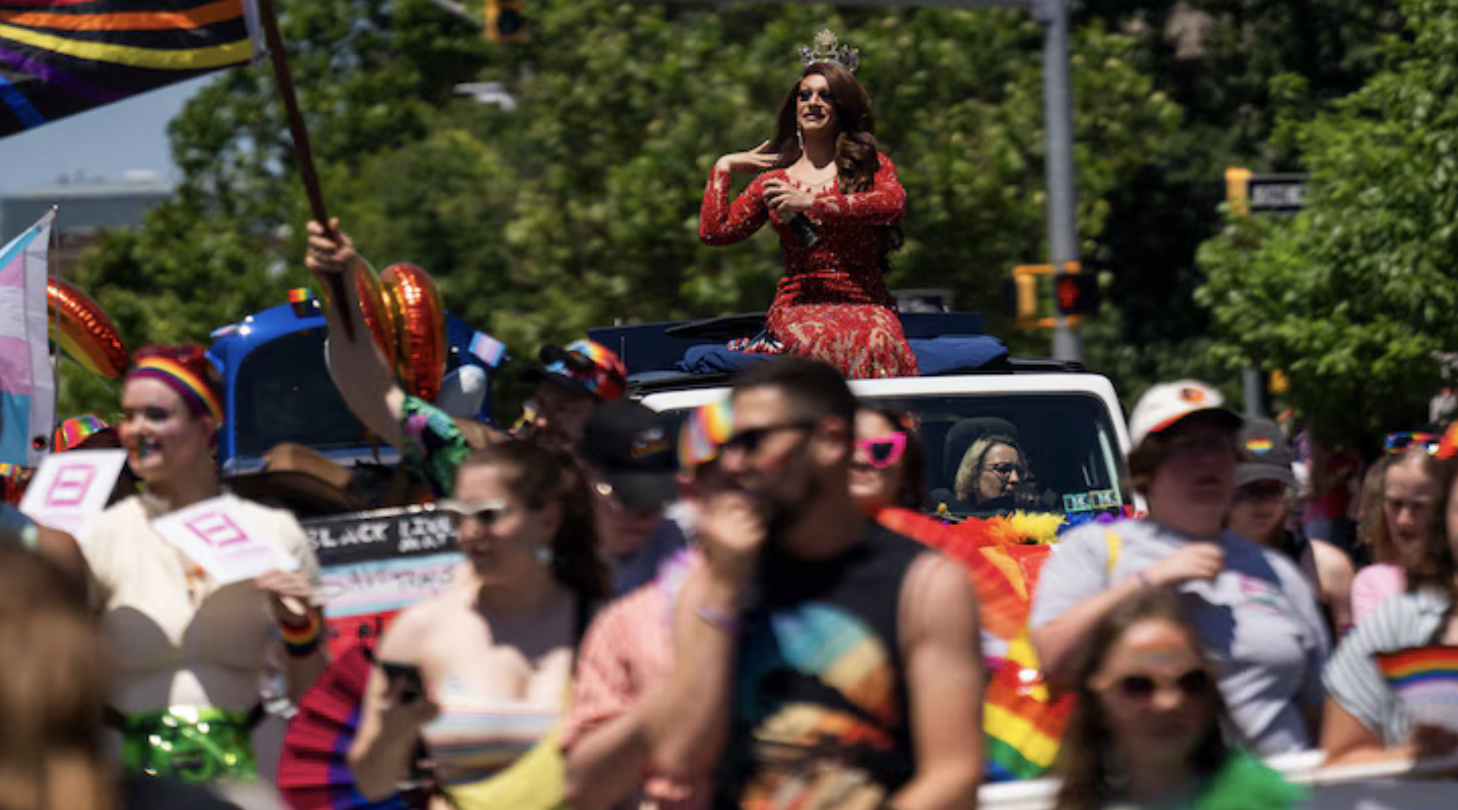
BY JOHN-JOHN WILLIAMS IV | This year’s Baltimore Pride Week attracted 150,000 people — record attendance that far exceeded initial projections of 100,000.
But some see room for improvement and want organizers to address safety issues and make changes so the annual event that celebrates the LGBTQ population is better run.
The rest of this article can be found on the Baltimore Banner’s website.
-

 Canada1 day ago
Canada1 day agoToronto Pride parade cancelled after pro-Palestinian protesters disrupt it
-

 Theater4 days ago
Theater4 days agoStephen Mark Lukas makes sublime turn in ‘Funny Girl’
-

 Baltimore3 days ago
Baltimore3 days agoDespite record crowds, Baltimore Pride’s LGBTQ critics say organizers dropped the ball
-

 Sports4 days ago
Sports4 days agoHaters troll official Olympics Instagram for celebrating gay athlete and boyfriend

